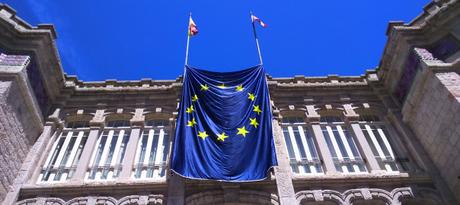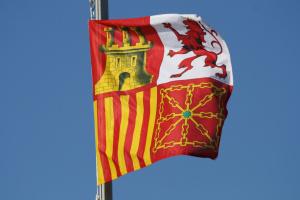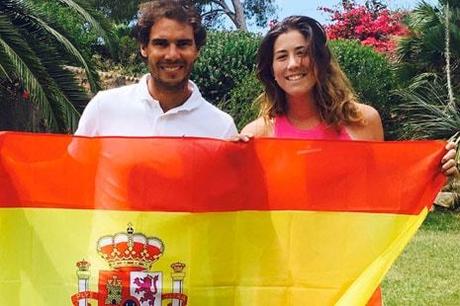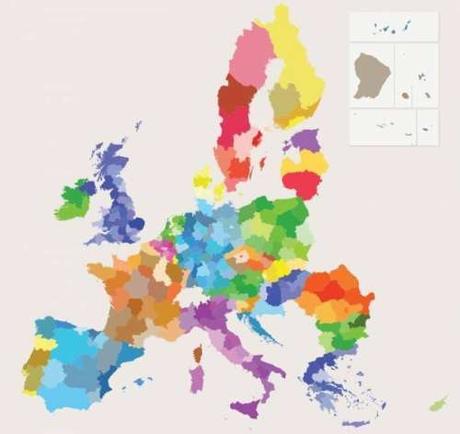
Europe, Catalonia, constitution, democracy, independence, law, nationalism, recommendation, referéndum, rule of right, separatism, solution, unity, vote History, Politics, Spain
Recently there's been too much talk in European fora about the problem in Spain with the Catalan separatist local government, who wants to arrange and independence referendum unilaterally and illegally on October the 1 st, 2017.
I already published an article in (Castilian) Spanish explaining facts, my position about it and proposing a solution (in case you can read Spanish): https://jocilesferrer.wordpress.com/2017/09/10/referendums-mitos-y-caprichos/
I think the issue deserves special explanation to foreigners, for they are not familiar with our history, old or recent, rule of law and system. And they just try to judge after what they have immediate access to: Spanish government actions and separatist propaganda. So it is not only the language (this article is not a translation of that one!).
This article is for you, European or citizen of the world, who wants to know what's going on with Spain and a part of it called Catalonia. Just to clarify: I am not neutral or agnostic, I love Catalonia and want it to remain in Spain. But I will not lie trying to convince anybody. Everything I'll state will be true as far as I know, or my opinion, which is not true or false, just an opinion. I'm not a brit and I preferred Scotland to remain in the UK and Britain to remain in EU, just because I strongly believe union is better for everybody's life. Independently of personal feelings. I'm also a European federalist / unionist for that reason, so I feel sympathy for union movements not for secession, almost in any case.
History and rule of right
Let's see a Little bit of History:
- Union of the Kingdom of Aragon and the County of Barcelona (Crown of Aragon): 1162
- Conquest of Mallorca: 1229
- Conquest of Valencia: 1245
- Union of the Crowns of Castile and Aragón (The Kingdom of Spain): 1516
It must be explained that on 711 there was an Islamic invasion of Spain, that resulted in Muslim rule over almost the whole country, except a small Christian kingdom in the northwest coast and mountains (Asturias), which resisted independent. A few years later, from the Pyrenees, the Franks from France set up a Christian "mark" in current Catalonia and Aragon; this was precisely the territory that begun to be called "Espagne" (from roman "Hispania") and resulted in the name "España". So Catalonia was the first part of Spain to be called after the current name for the whole country.
The Spanish Christian kingdoms and counties began a slow but systematic war to "recover" the country from the Muslims. They evolved, and in 1492 the effort ended up with the conquer of the last Muslim kingdom, Granada. In parallel Christopher Columbus and his crew arrived to America but that's another story... By 1516 four Christian founder kingdoms, Castile, León, Navarre and Aragon, had been united in the Kingdom of Spain, basically with the actual territorial configuration (Iberia and islands). Only Portugal remain apart until today.

Catalonia was never invaded to be incorporated into Spain, on the contrary, it is part of the founder territories of current Spain. Catalans and Aragonese together conquered Valencia and the Balearic Islands to get them rid from Muslim rule and incorporate those kingdoms into the Crown of Aragon. From 1516 Catalonia and the Catalans took part as any other parts of Spain and Spaniards in civil and external wars, but never as an independent kingdom or state.
After a terrible Civil War (1936-1939) and 40 years of dictatorship, Spain became a Democracy (Parliamentary Monarchy, like the United Kingdom of Great Britain and Northern Ireland). The first democratic elections, took place in 1977 and the current Spanish Constitution was approved in 1978 by referendum. The Catalans also voted, naturally on that referendum and the vast majority of them said yes, just like in the rest of the nation. By the way, Catalan nationalists took part in the wording of that constitution, introducing articles for self-government and recognition of the different identities (languages, culture, specific needs...) inside Spain. This resulted in an "Autonomies State". Spain is organised in 17 autonomic regions, with their own governments and parliaments, similarly to the Federal Republic of Germany, but even with a broader degree of autonomy.

Hence the current Spanish system is democratic, legitimate and there is rule of right. Otherwise it would not have been accepted into the European Union. The government, the laws and even the Constitution can be and they are indeed changed, but via democratic legal proceedings (vote). I really do not see a basic difference with France, Germany or Italy. Make yourself this question: Do the French, Italian or German Constitutions behold a procedure that immediately accepts unilateral referendums for secession, just because some local governments want to set them up? Let's say Corsica, Lombardi and Bavaria as examples. I am quite sure they do not. So, in what sense is Spain special, or dictatorial? By the way there is no local autonomy and government in France at all, only administration, I do not hear any one blaming France today for that reason (there is a part claimed by Catalan nationalists in France...). This is the French own business and I'm sure it is this way because the majority of French citizens want it to be this way.
Percentages of opinion, recommendation
After poll ( 2ª encuesta C.E.O. de 2017) these are the percentages of Catalan (resident) citizens in favour of the different options:
- 30.5% autonomous community (current situation),
- 21.7% federal state (within Spain),
- 9.1% does not know,
- 5.2% region (no self-government at all),
- 2.6% no answer.
This reflects that 65.4% of Catalans are at least open to a solution within Spain.
However, after another poll ( ara.cat) in June 2017, 68.5% of the Catalans are in favour of carrying out a referendum about the independence.
The conclusion for me is clear, Catalan citizens strongly want to be asked if they want to remain in Spain, and a vast majority wants some kind of solution within Spain but involving an autonomous government. And also they want to re-negotiate with the rest of Spain (the "central government" for some) the conditions and terms of belonging.

So, what would be my recommendation for the Spanish Government (and this is my own opinion)? Today just apply the law and stop the illegal referendum on the 1 st of October. Rule of right and real democracy must prevail, and the non-separatist majority of Catalan citizens must be protected if necessary. Nevertheless, a legal referendum must be set up and announced as soon as possible, so everyone, especially the separatist knows it will be. It should be organised and controlled by the Spanish legitimate government and negotiated with all the parties in the Parliament, and of course, with the Catalan government and representatives. If necessary (I guess it is) the Constitution would be modified for the occasion, this should be easily negotiated within the principal parties. The scope should be 2-3 years, with time for both parts to explain very clearly their "programmes" and above all the consequences of each option. The "winning" part would be of course in charge of ruling the application of either result, so it cannot be used as an eternal menace or victimising argument anymore. Good example of modus operandi: David Cameron's referendum in Scotland. Example of what never to do: Brexit referendum, also by David Cameron, UKIP and others...
If you want more detail about the issue, here I have reproduced some questions or statements that participants in pro-European fora have done (September 2017), and my answers and comments to them. I thank everybody for their interest, independently of their positions which usually consist of just neutral curiosity.
- 'Main:' stands for the original statement of the publication.
- 'RJF:' stands for my comments or answers to it or further comments.
- 'Comment:' stands for some other participant's comment or question to the main statement or to me.
The issue has far exceeded the label of "an internal Spanish problem"
Main: "Regardless of your thoughts on Catalonia, I think the issue has far exceeded the label of "an internal Spanish problem". I think it would be wise for the EU to send in diplomats, negotiators, and lawyers before something bad happens. What are your thoughts? How can we defuse the tension - on both sides?"
RJF: "This is also Catalonia, at least half of the population in favour of remaining with Spain and EU... Correction: 65% of the Catalans are open to a solution within Spain or are directly in favour of remaining. However 68% want to vote in a referendum. So the solution seems very clear for me (a one who wants Spain to remain as it is, with Catalonia in): let them vote and say they want to be with us, and then we can discuss anything better for all.
Abstract: 65% of the population is in favour of a solution within Spain. But 68% of them are also in favour of a referendum which has been denied so far by Spanish government. There's been 40 years of Catalan nationalist hegemony in local government, propaganda and education. The separatist are very active and becoming violent. The rest is used to look away and focus on their business thinking nothing bad will happen. My recommendation is the Spanish government to call for a referendum in 2 years scope with the opportunity for each side to explain programmes and most important, consequences of either choice. What I would ask from the rest of Europe is to support the Spanish unity cause but recommend this referendum. Spain exists as a nation since 1516 and Catalonia was already together with Mediterranean Spain since 1150. Quite a long time... I'm speaking about a Scotland or Quebec - like referendum, in two years everyone explaining positions and consequences. Of course ESP constitution would have to be updated, but the government, alongside constitutional parties (the majority) can do that."
Comment: "The Catalonia situation is interesting if the central Spanish government don't accept the 'illegal' referendum result then what?"
RJF: "The illegal referendum won't be accepted even taken into account in any case. I remind you Spain is a full democracy and rule of right. The Spanish constitution which was approved by referendum in 1978 also by the Catalans, does not allow for that. Nevertheless I think the current government should modify it and arrange a legal referendum in two years scope (Scotland model). Independentism radicals are using violence and menaces against those Catalans don't follow them. Of course the government must protect the citizens. I think they seek the government's reaction to appear as victims."
RJF: "It would be good and appreciated advice on peace keeping and discussing democratic solutions. But keep always in mind the Spanish government, laws and parliament are fully democratic, approved by the will of the citizens. Otherwise Spain would not be accepted in the EU. And that the kingdom of Spain exists as it is today since 1516 through kings marriage. Catalonia was never conquered nor incorporated, on the contrary, it was one of the Christian founding territories that fought the Muslims out of Iberia. Not at all comparable with ex-Yugoslavia. Even the union of England and Scotland is young compared to. Just for clarification"
Comment: "In the unlikely case that this referendum will be held and the Catalan voters decide to separate from Spain".
RJF: "on 10.01 it would be no (legal) referendum, just an enquiry. Actually I am in favour of a legal one, but organised by the ESP government".
Comment: "who has then the right to become Catalan citizen? Those living there or Catalans for generations, everyone?"
RJF: "anyone paying taxes today there which makes very funny their "historic" argument. For instance I have a "Catalan" mother family name (Ferrer), someone arrived 10 years ago to Catalonia would have the right to make a foreigner in a Land that was part of my ancestors nation since 1150."
Comment: "Can they keep the Spanish/European passport?"
RJF: "There are 2 kinds of nationalists, the CUP (extreme left, but actually Nazis) who want to say goodbye to everything ESP, EUR, ECB, Euro, even to Coca-Cola. And the not so crazy ones, who pretend to keep all the current ESP and EUR benefits they have right now. They don't realize the day after the independence they are like Algeria for us (best case). This is what I would like to very clearly explain to them in a 2 years scope for an independence referendum (Scotland like)."
Comment: "Do the separatists have any plans how this state will be organized?"

RJF: "Of course not. Or yes, the CUPs: kill everybody else (like Nazis / communists do). The rest, they just don't have one: "I go with another boyfriend but I still sleep in your house, and you pay for my crashed car... Actually my ancestors (mother side) are from Aragon, at least everyone known. Ferrer is even more extended in Valencia and Balearic Islands, but common in Aragon and Catalonia. It's funny, in Barcelona it is number 20 in frequency and is the first one not "Castilian""
Catalan separatists burning the EU flag together with the flags of France and Spain
Main: "Catalan separatists burning the EU flag together with the flags of France and Spain in Barcelona during the "Diada" rally. This kind of hatred has no place in Europe."
RJF: "The funny thing is that there are 2 very different branches of Catalan separatists (this is why they will fail for sure): Those in the picture (CUP) want to establish a communist revolution in Catalonia, breaking with everything: ESP, EU, the Euro currency, NATO of course, and the ECB above all.
The other branch (Junts pel sí) is actually PDeCAT + ERC (Christian democrats + socialists) who want to carry out an illegal referendum and the next day they pretend to keep all the benefits of being in ESP and EU (and NATO), but being unilaterally independent of Spain. Of course this will not happen, if they should ever succeed, immediately they would have an international status comparable to Serbia (best case...). Out of everything they like."
Comment: "fake news is the ad hominem of the decade"
RJF: "It's no secret the CUP want to leave EU, NATO, ESP and force Valencia and Balearic islands to join Catalonia on their road to nowhere. Even if that picture were fake"
Comment: "It's interesting how many people in this group are opposed to giving the Catalans an independence referendum because it will cause further division in Europe'; yet support Scottish independence despite the nationalists losing their referendum in 2014."
RJF: "Quite funny. My position: I am Spanish, opposed to Catalan independence, but thinking the best solution is a referendum in two years (Scotland model). I prefer Scotland staying in the UK, though I 'm of course not happy with Brexit. 65% of Catalans (residents) don't support independence, however 68% want such a referendum, so maths are clear for me... Nevertheless the Spanish constitution would need to be updated for such a referendum to be legal. I would recommend the Spanish government to do so and take control of it. Again Scottish example is a good practice"
Comment: "I'm in favour of regionalism as an expression of nationalism - national governments should not have a monopoly on which 'nationalism' is acceptable"
RJF: "I don't see the sense of a part of a current EU state being separated from the rest. Unless there are two clear parts that agree by majority on keeping apart (Czechs and Slovakia example). Otherwise it means at least one part does not want the division and is abandoned. That would be the case of Spain and Catalonia or Britain and Scotland. In such a case, if the quitting ones are free to abandon, the abandoned ones are free to state the new relationship and this can be "you don't exist for me anymore" in the short term at least.

I'm convinced nationalism has not anything good for humankind. It has only brought pain, death, hunger, war to the world. I'm interested in an EU of the citizens not of the nations / countries / regions. I want to have the same rights and duties and rule of law in Madrid, Barcelona, Dublin, Athens, Berlin, Bucharest or Helsinki. And I will feel myself what I like. I'm happy and even proud being Spanish, though this is not my first characteristic as human being. I feel rather Iberia (Spain + Portugal + islands) as my small motherland, and of course Europe. I hope one day this wonderful project of liberty, equality and fraternity called EU will succeed and my grandsons will see it spread to the rest of Planet Earth and beyond!"
Why and/or how the Spanish Constitution does not accept referendums
Main: "Could someone explain to me why and/or how the Spanish Constitution does not accept referendums? Thanks."
RJF: "ESP constitution does accept referenda, but not secession processes. I believe there is no constitution in Europe prepared for secession. Do the French, German, Italian... have? I don't think so. Even USA, some states tried a secession (very democratic, the confederates decided it) in XIX century and there was a civil war. So we are not Martians. Of course it can be formally updated, but it must be done through democratic, legal actions by our elected representatives."
Comment: "Basically this referendum can be taken by the central government in a legal action?"
RJF: "Yes, but the ESP parliament has to approve the modification. Actually there are some parties (PSOE, social democrats) proposing it, in order to better fit Catalonia and other regions. Which I find sound (though I don't vote them usually). If they win the elections or are able to form a majority in the Parliament, they'll do it."
Comment: "I agree but Catalonia has just 1/6 of the Spanish citizens. How can they elect someone to change the constitution? Even if the whole Catalonia would vote for a secessionist party it would be impossible. Also, sorry for the naive simplification, but isn't it like a divorce between a wife and husband? Why both spouses (the whole country) have to agree with?"
RJF: "First of all, this is the current rule of right. Democratic, legitimate and approved. Just think in the same problem in France, Germany or Italy, do their constitutions accept it? Would they just say "OK you want to leave me, leave me then"? The divorce comparison is a good one. But for the consequences. Second, Spain is a 500 years' nation, as it is now. Catalonia was never conquered, on the contraire, it is one of the "founding" territories. So, my ancestors have been at home in Catalonia or any other part of Spain for 500 years, so, why should someone living the last 20 years in Catalonia have the right to make me a foreigner? I live in Madrid and I don't feel myself legitimate to make foreigners here any other Spaniards, just because it would be much beneficial for me, Madrid to be an independent state within EU (les taxes...)".
October 1st independence referendum deemed illegal by Madrid
Main: "Spain's state prosecutor on Wednesday ordered a criminal probe of Catalan mayors who cooperate with an October 1st independence referendum deemed illegal by Madrid and threatened to arrest those who do not comply."
RJF: "It is not "deemed" illegal "by Madrid". It's just out of the ESP Constitution which was approved by referendum in 1978 by all Spaniards, including the Catalans. That being said, I'm in favour of doing a legal one, in two years scope with time for both parts to explain the proposals and consequences. 65% of the Catalans are not in favour or independence. 68% are in favour of such a referendum though. Bon dia a tothom."
Comment: "Actually it is deemed illegal - the constitution is the law in Spain, but with Madrid refusing to consider amendments to the constitution (unless it's for regions governed by the PP or to bail out the banks) Catalonia has no choice but to hold an "illegal" referendum. By the way, did you vote for the Constitution in '78?"
RJF: "I insist, I live in Madrid, so somehow I'm part of "Madrid" and we are not declaring anything illegal. For we simply cannot, the citizens. The Constitution can indeed be updated, if a majority of representatives in the parliament vote and decide to do so. If they don't do that, it means the majority of Spaniards don't want to. Otherwise they (we) will vote in another manner next time. That's democracy. Actually there are parties offering that (PSOE...), we are free to vote or not for them. By the way. Do the French, German, Italian... Constitutions behold a proceeding for the secession of part of their territories? By unilateral decision of Corsica, Bavaria or Lombardy, just to state some examples. I guess they don't. So what is weird about the Spanish laws and government? Nevertheless, I repeat, I think the government should negotiate a referendum in Catalonia in 2-3 years, amending the constitution if necessary (Scotland model), but that's my opinion, and I have other priorities when voting: employment for me and my children, freedom, security, low taxes, low political control over citizens...
I currently live in Madrid, though I am not from. As Madrid is "richer" than the rest of Spain it might be very convenient for us, to be an independent state within EU. This might also be the case for Île de France, Bavaria, Ruhrgebiet, Milano, and other high tech areas. Do you really feel every region that feels "better" than their peasant country fellowmen should be granted the right to separate from them? This is exactly the case of 35% of the Catalans, no victims at all of a lack of democracy"
I hope this post can be part of the solution of the problem in a pacific, democratic, civilised and beneficial manner for a vast majority of citizens, Catalan, Spanish and European.
If you liked my explanations and opinions, you can contact me on:
Curiosity: Maybe you don't know in Spanish and Portuguese speaking nations, we have two family (last) names, one from father (Jociles in my case) and one from mother (Ferrer in my case) and we keep them for ever. Wives don't change to their husbands' when they get married. And we pass them on to our children. I love both of them for they reflect my two branches of ancestry and I want them both stated everywhere in the world.
Thank you very much for your interest.

